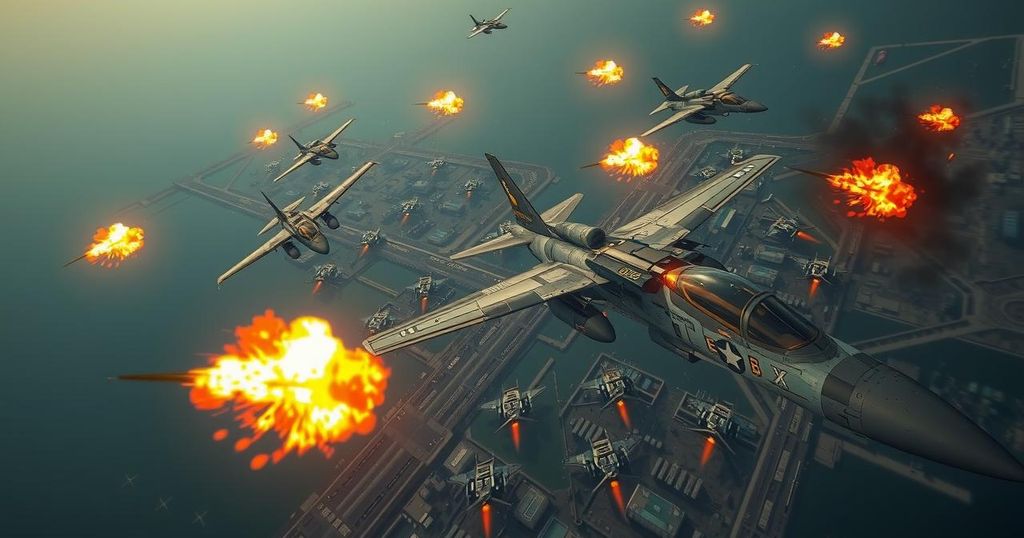Recent rocket attacks from Lebanon have led to the deaths of seven individuals in northern Israel, heightening the ongoing conflict involving Iran-backed groups like Hezbollah and Hamas. This escalation coincides with diplomatic efforts from the U.S. aimed at securing cease-fires in the region. The Israeli military has conducted airstrikes targeting Hezbollah’s operations in Syria, necessitating large-scale evacuations and resulting in thousands of casualties. Proposed cease-fires face significant skepticism as negotiations remain stalled amidst entrenched positions.
Recent developments in the ongoing conflict involving Israel and groups backed by Iran have resulted in a tragic escalation of violence. On Thursday, rocket fire from Lebanon claimed the lives of at least seven individuals in northern Israel, including four foreign workers, marking the deadliest incident of its kind since Israel initiated military operations earlier this month. This uptick in hostilities coincided with the presence of senior U.S. diplomats in the region, who were advocating for cease-fire agreements amidst the escalating wars involving Israel and Iranian-aligned factions in the Middle East, during the concluding months of the Biden administration. The Hezbollah militant organization has systematically launched rockets, drones, and missiles into Israel, prompting retaliatory strikes in response to Hamas’s attack on October 7, 2023, which catalyzed the current conflict in Gaza. Both Hezbollah and Hamas serve as ideological allies, long considered proxies of Iran and designated as terrorist organizations by several countries, including the United States and Israel. In response to the ongoing aggression, the Israel Defense Forces reportedly executed airstrikes targeting sites near the city of Qusair in western Syria, allegedly where Hezbollah was amassing weaponry for smuggling purposes. Syrian news reports have indicated that these airstrikes resulted in the deaths of at least five individuals. This conflict intensified last month when Israel launched extensive airstrikes across Lebanon that led to the death of prominent Hezbollah leaders, thereby escalating ground operations. According to reports, almost two dozen Israeli soldiers have died in Lebanon since the onset of these hostilities, with Lebanese health officials estimating that approximately 2,000 individuals have perished as a result of airstrikes in Lebanon. The Metula regional council in northern Israel confirmed the latest rocket attack, detailing that five lives were lost without disclosing specific details regarding the munitions utilized. The nationalities of the four foreign workers who were killed were not immediately determined. Metula, situated at Israel’s northern border and surrounded by Lebanon, has endured significant damage from rocket fire, resulting in the evacuation of its residents, leaving primarily security personnel and agricultural workers in the area. In a disturbing development following this incident, emergency response teams confirmed the deaths of two additional individuals, indicating continued fatalities from the sustained attacks. The Israeli military reported that around 25 rockets were fired from Lebanon during this particular assault, which struck an area where civilians were engaged in harvesting. Hezbollah’s newly appointed leader, Sheikh Naim Qassem, in a video statement, asserted that the militant group would persist in its conflict with Israel until it receives terms for a cease-fire that meet its criteria, emphasizing that Hezbollah remains fully equipped and capable of sustaining a prolonged confrontation. As regional tensions escalate, the Israeli military has issued warnings for further evacuations in southern Lebanon in light of new strikes that claimed additional lives. The ongoing conflict has resulted in over 2,800 fatalities and nearly 13,000 injuries in Lebanon, with around 1.2 million people displaced since the war’s inception. Within Israel, attacks from Hezbollah have resulted in at least 68 deaths, approximately half of which were soldiers, and over 60,000 Israelis have been evacuated from border regions. Amid these conflicts, the U.S. and other nations have been proposing various measures to mitigate hostilities during President Biden’s remaining time in office. Negotiations aimed at a cease-fire remain stalled as neither side has indicated a willingness to concede to the other’s demands. Notably, senior White House officials have returned to Israel to discuss possible cease-fire arrangements and the release of hostages held by Hamas, reflecting an ongoing commitment to finding resolution. One proposal under consideration suggests a two-month cease-fire contingent upon the withdrawal of Israeli forces from Lebanon, coupled with a cessation of Hezbollah’s military presence along its southern border. However, Israel remains skeptical regarding the effectiveness of U.N. peacekeepers in maintaining security and sustaining the envisioned buffer zone. Concurrently, proposals have surfaced for a four-week cease-fire in Gaza contingent upon the release of hostages, although Hamas appears unyielding in its demands for a more comprehensive cease-fire agreement.
The conflict between Israel and Iranian-backed groups, particularly Hezbollah and Hamas, has deep roots in regional tensions characterized by ideological divisions, territorial disputes, and historical animosities. Following Hamas’s recent attacks, Israel launched a series of military operations targeting key figures and infrastructure associated with these groups. The geopolitical landscape further complicates the situation, as diplomatic efforts led by the U.S. and other nations strive to quell the violence and negotiate cease-fires while addressing the humanitarian crises resulting from the conflict. With external actors involved, the prospects for a stable resolution remain uncertain amidst ongoing military engagements.
The recent surge in violence stemming from the conflict between Israel and Iranian-backed groups has resulted in significant casualties on both sides and exacerbated an already precarious humanitarian situation. Despite diplomatic efforts from U.S. officials and proposed cease-fire agreements, both parties continue to stand firm in their positions, making immediate resolutions elusive. The complexity of regional dynamics further compounds the challenges facing negotiators, highlighting the urgent need for a sustainable peace process concentrated on long-term security and stability in the region.
Original Source: www.cbsnews.com






